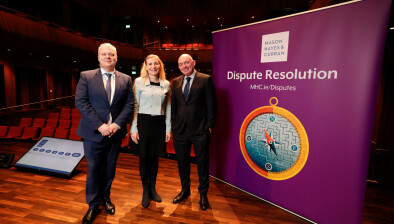Brian Speers: Compulsory mediation – a step forward

Brian Speers
Belfast solicitor Brian Speers, chair of the Law Society Mediation Service (LSMS) in Northern Ireland, writes on an important case for those interested in developments regarding mediation.
On 29th November 2023, the Court of Appeal in England and Wales issued its judgment in the case of James Churchill v Merthyr Tydfil County Borough Council [2023] EWCA Civ 1416.
The court ruled on whether parties can be compelled to use alternatives to the court system. In an important departure from the seminal case of Halsey v Milton Keynes General NHS Trust [2004] EWCA Civ 576, the Court of Appeal considered that observations by Lord Dyson were obiter and therefore the original trial judge in the case under appeal was not obliged to follow them.
The case under appeal had somewhat ordinary beginnings. Mr Churchill, whose garden abutted lands owned by Merthyr Tydfil County Borough Council, alleged that the council had failed to control Japanese knotweed on its land. As a consequence, his garden had been infested. The council asked that Mr Churchill’s claim be stayed so that the council’s internal complaints procedure could be used to endeavour to resolve the matter.
The Court of Appeal were asked whether or not parties could be compelled to use mediation or some other form of non-court-based resolution process — such as the council’s housing disputes scheme.
Lord Dyson said in Halsey:
“to oblige fully unwilling parties to refer their disputes to mediation would be to impose an unacceptable obstruction on their right of excess to the Court”
The original trial judge held that not only was he obliged to follow that Dyson dictum but that Mr Churchill had acted unreasonably for failing to engage with the council’s complaints procedure.
In a Court of Appeal comprising the new Lady Chief Justice Lady Kerr, Lord Justice Birss and Sir Geoffrey Vos, Master of the Rolls, the Court of Appeal ruled that the observations of Lord Dyson, while of general importance, were in fact not a necessary part of the reasoning that led to his decision in the case. In old fashioned Latin, the dictum was not part of the ratio decidendi and was an obiter dictum.
Liberated from the obligation to adhere to the Halsey position, the Court of Appeal went on to conclude that it can be appropriate for the court, in its discretion, to require parties to use what the court called “non-court-based dispute resolution”.
It is of no surprise for those who attended the Commonwealth Lawyers Association’s mediation conference in Belfast in May 2022 to find that Sir Geoffrey Vos delivered the principal judgment in this Appeal. Sir Geoffrey has long advocated that civil justice comprises litigation, arbitration, and mediation and all have their part to play in disputes.
At paragraph 59 of his judgment, he said “experience has shown that it is extremely beneficial for the parties to disputes to be able to settle their differences cheaply and quickly even with initially unwilling parties mediation can often be successful”.
Therefore, the way is now open for courts to compel initially unwilling parties to attempt some form of dispute resolution — the most notable form of which is likely to be mediation. At paragraph 65, Vos MR observed:
“the Court should only stay proceedings for, or order, the parties to engage in a non-Court based dispute resolution process provided that the order does not impair the very essence of the claimants right to proceed to a judicial hearing and is proportionate to achieving the legitimate aim of settling the dispute fairly quickly and at reasonable cost.”
Some consideration was given to setting out criteria or a list of principles, but Vos MR concluded that there should not be any fettering of a court’s discretion.
This case was also notable for the number of intervening parties, which included the Law Society of England and Wales, the Bar Council of England and Wales, the Civil Mediation Council, CEDR, the Chartered Institute of Arbitrators, the Housing Law Practitioners’ Association and the Social Housing Law Association. All had very eminent representatives and therefore the Churchill and Merthyr Tydfil judgement is likely to redefine the law for a considerable period to come.
While the acronym NCBDR is not as catchy as ADR, nevertheless this judgment represents an important endorsement of mediation. It will encourage advisers and parties that they must seek to resolve disputes while at the same time it preserves the entitlement of the parties to a judicial decision-making process.
It remains to be seen whether courts will compel parties to take part in mediation. It also will be important to gather information as to the experience of parties who have been obliged to take part in mediation. Will they “go through the motions”? Or will they say we have been required to do this, therefore let us make the most of it?
Much, I believe, will depend on the skill of the trained mediator following an appropriate mediation process.
It is noteworthy that for nearly 20 years the UK position has been to adopt Lord Dyson’s words in Halsey that the court’s role is to encourage, not to compel. Now we find that under Vos MR, the court’s role, sometimes, can be to compel.
- Brian Speers is chair of the Law Society Mediation Service.









